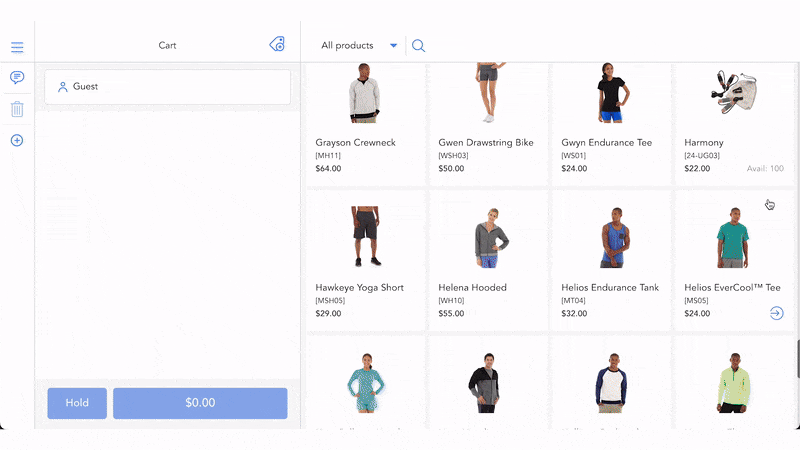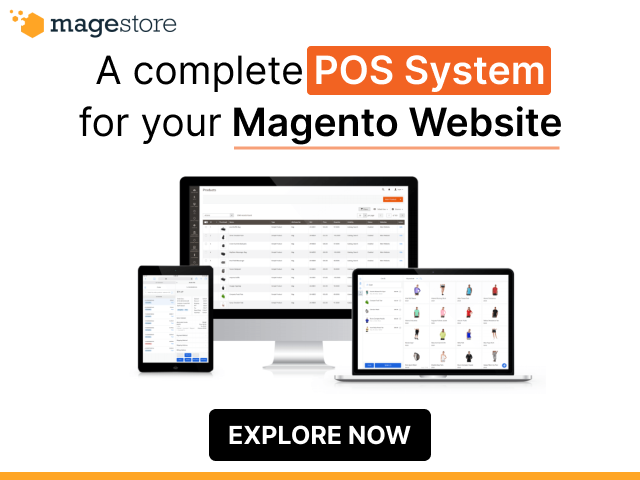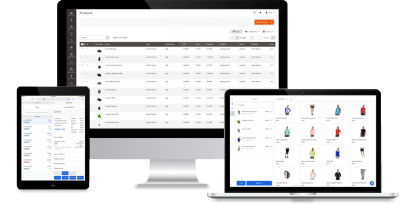Choosing the best Magento 2 POS for you requires careful consideration.
The degree to which a POS system can work with Magento varies. Inadequate integration may limit the POS’s ability to utilize Magento’s capabilities fully. In specific instances, certain POS systems might encounter issues like data inconsistencies and other complications due to this limited integration.
Drawing from over 14 years of experience assisting Magento merchants with POS solutions and direct familiarity with a range of POS offerings, we’ve made a comprehensive list of the best Magento POS systems curated just for you.
Furthermore, we’ve developed an all-encompassing guide to aid you in choosing the appropriate POS system for your business needs. This resource is founded upon our rigorous testing, extensive research, and valuable insights garnered from customer feedback.
Best POS systems for Magento: a comparison chart
POS | Key features | Starting price | Customer reviews | Rating |
Magestore POS |
| Custom pricing |
| 4.7/5 |
BindoPOS |
| No public |
| 3.8/5 |
Webkul POS |
| $199 |
| 4.4/5 |
Ebizmarts POS |
| $350 |
| 3/5 (4 reviews) |
BoostMyShop POS |
| $487.65 |
| 4.6/5 (3 reviews) |
Supermax POS |
| $499 |
| 5/5 (2 reviews) |
>>> Might you like: What is Magento POS? Differentiating native and non-native solutions
Best Magento POS: a detailed review with insights from genuine customers
Best paid POS system for Magento
1. Magestore POS – Magento-native POS for real-time data sync , customization, and seamless integration
Magestore POS is the best POS system with offline mode for Magento because it’s the ultimate solution for businesses looking to scale or tackle distinct retail challenges that generic POS systems struggle to solve. While various POS solutions offer extensive features, the diverse retail landscape presents many unique issues that no single vendor can fully cover. This is where Magestore POS excels. We specialize in crafting tailored Magento web POS solutions that cater to the specific needs of each business.
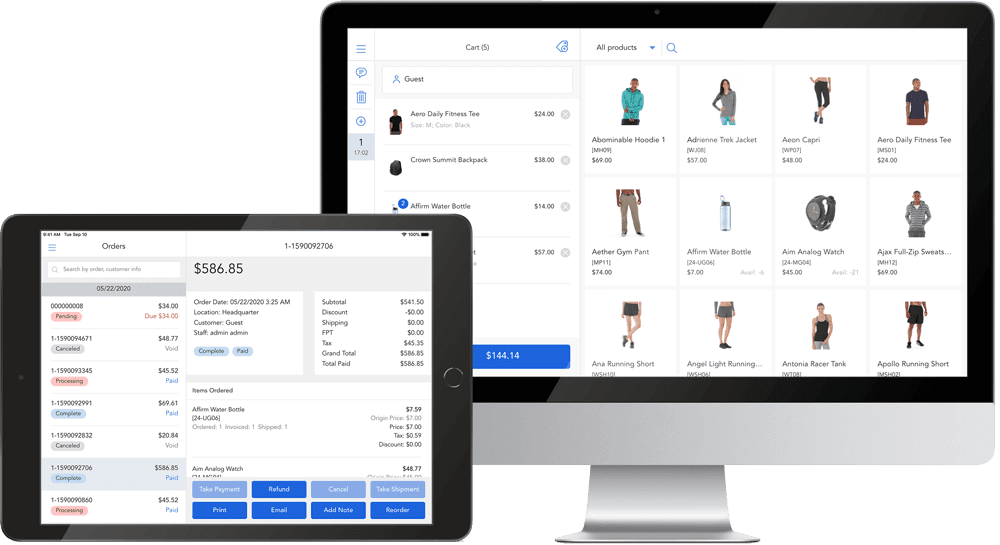
If you’re encountering unique retail challenges that generic POS systems can’t address, schedule a consultation with us and claim your free tailor-made EPOS for Magento solution design to solve your problem now. If expansion is on your mind, consider Magestore POS a budget-friendly choice.
The initial cost depends on the number of stores at the time of purchase, and after that, adding new users and devices incurs no additional charges.
As a native solution, Magestore POS is the best POS to integrate with Magento, presenting two key advantages that are often absent in non-native POS solutions: robust integration with Magento for system stability and the ability to leverage all of Magento’s powerful features.
Prices:
Tailored pricing according to your business’s size, distinct requirements, and objectives.
Pros | Cons |
|
|
Features:
- Fast order creation and processing in less than 1 minute
- Real-time synchronization across channels and devices
- Flexible Magento loyalty program and promotion
- Multi-store management
- Accurate inventory management for multiple locations and warehouses
- Convenient Magento click and collect
- Advanced order fulfillment
- Centralized purchasing
- Barcode scanning support
- Easy return & refund and convert the refunded amount to store credit or gift card
- Get insights into your sales, inventory, and customer behavior with POS reporting and analytics.
- 3rd-party integrations with ERP, CRM, accounting, payment, shipping, and more
- Multichannel selling
- PWA POS to use as an app
2. Ebizmarts POS – Flexible and mobile POS solution for Magento stores
Ebizmarts specializes in providing POS, payment, and email marketing extensions, offering free Mailchimp and payment integration within your POS subscription. The Mailchimp extension is included in the package.

Moreover, users have numerous options to customize receipt features. Ebizmarts’ packages are generous, with no charges for order volume or setup fees. All users get a free test account and email support. The Enterprise+ package offers even more enhanced features.
🔔 Read more: Ebizmarts POS vs. Magestore POS
Prices:
- Enterprise: $350/month, plus $99 per month for additional key
- Enterprise +: custom pricing
Pros | Cons |
|
|
Features:
- Manage data quickly through a user-friendly iOS interface
- Apply instant discounts on orders by percentage, fixed amount, or custom price
- Set different prices for products based on Customer Groups
- Unify your customer base across both physical and digital channels
- Customize tax settings to accommodate various scenarios
- Easily keep track of cash, adjust amounts, and generate shift reports
3. Webkul POS — Versatile POS extension for various eCommerce platforms
Another POS system for Magento that we can’t overlook is Webkul POS — an affordable choice for new Magento merchants needing essential features.
They stand out with their user-friendliness and strong support. The POS efficiently manages multiple physical stores and retail outlets across locations, synchronizing crucial data like sales, orders, inventory, and products with your online store.
The system works in both online and offline modes. Upon internet reconnection, it seamlessly syncs offline store sales and customer data with the online store, ensuring uninterrupted operations.
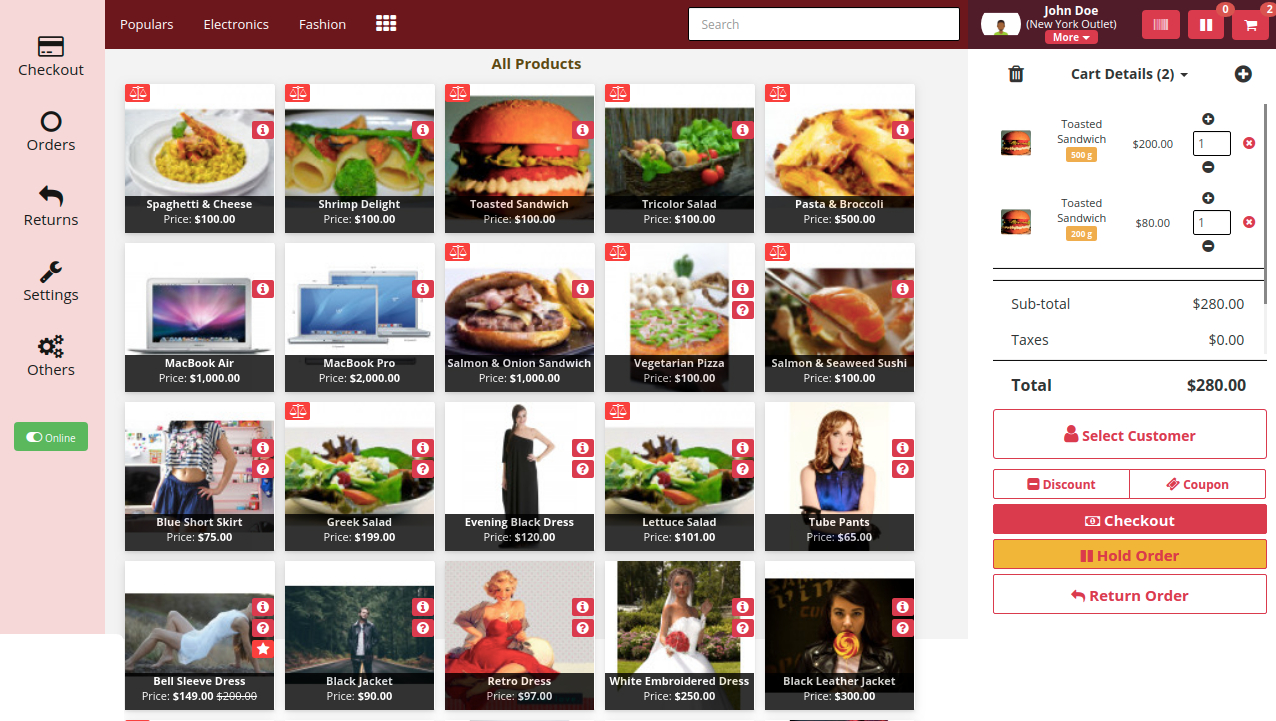
Prices
Product:
- Community Edition: $199
- Enterprise Edition: $398
- Enterprise Cloud Edition: $398
Support:
- 3 months: no extra cost
- 6 months: $79.60
- 1 year: $99.50
Installation: $150
Pros | Cons |
|
|
Features:
- Synchronize data in real-time
- Display stock status
- Assign sales representatives to physical stores
- Work in offline mode
- Search customer accounts by phone number
- Support a wide range of payment options
- Allow shopping cart holding
- Offer comprehensive sales reports
4. ConnectPOS — Omnichannel POS for small businesses
ConnectPOS offers an affordable monthly subscription fee, making it suitable for small businesses in their early stages of exploring POS system needs.
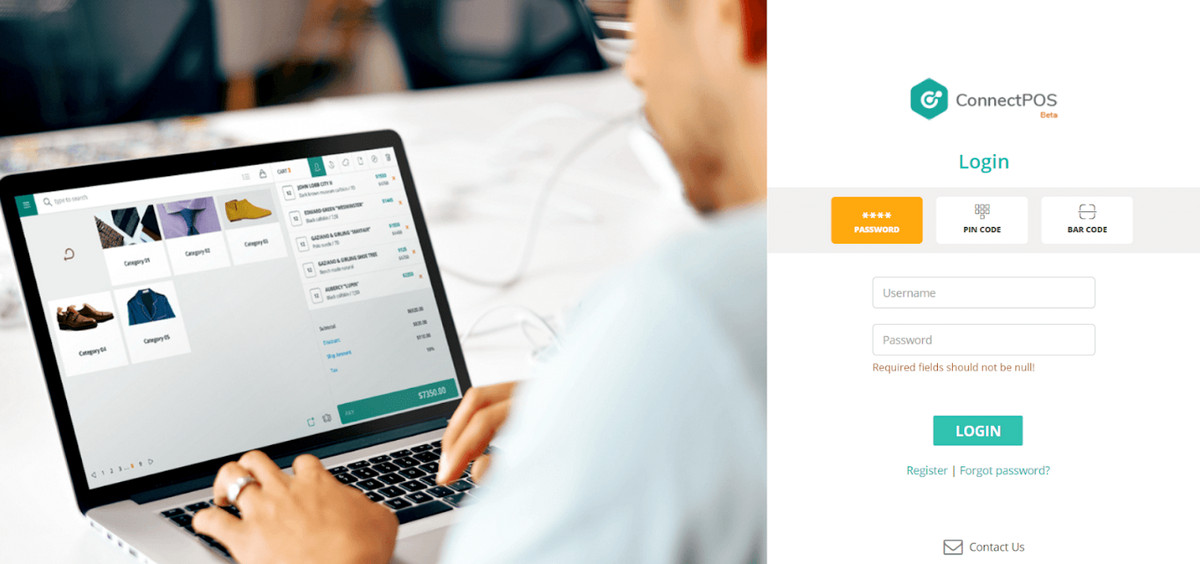
ConnectPOS provides versatility by working on both app and web browsers, giving users device options. Their standout customer service includes live chat, email, and WhatsApp call support.
Additionally, ConnectPOS offers built-in multi-currency support for Premium plan subscribers.
👉 Read more: ConnectPOS vs. Magestore POS
Prices:
Tailored pricing designed for each business’s unique needs.
Pros | Cons |
|
|
Features:
- Manage customers, rewards, and order details effortlessly
- Add notes, save on-hold orders, and create order numbers in-app
- Configure tax levels and locations easily for each order
- Support various payment options with integrated services like Tyro, PayPal, and more
- Switch between stores and check stock directly within the system
5. BindoPOS — Secure POS and payment solution for F&B, retail and hospitality
If you’re a small business seeking a user-friendly POS solution, consider Bindo POS.
Pricing starts at $59 per month for the initial register and can support up to 20 retail outlets. However, there are various pricing plans and customization options available.
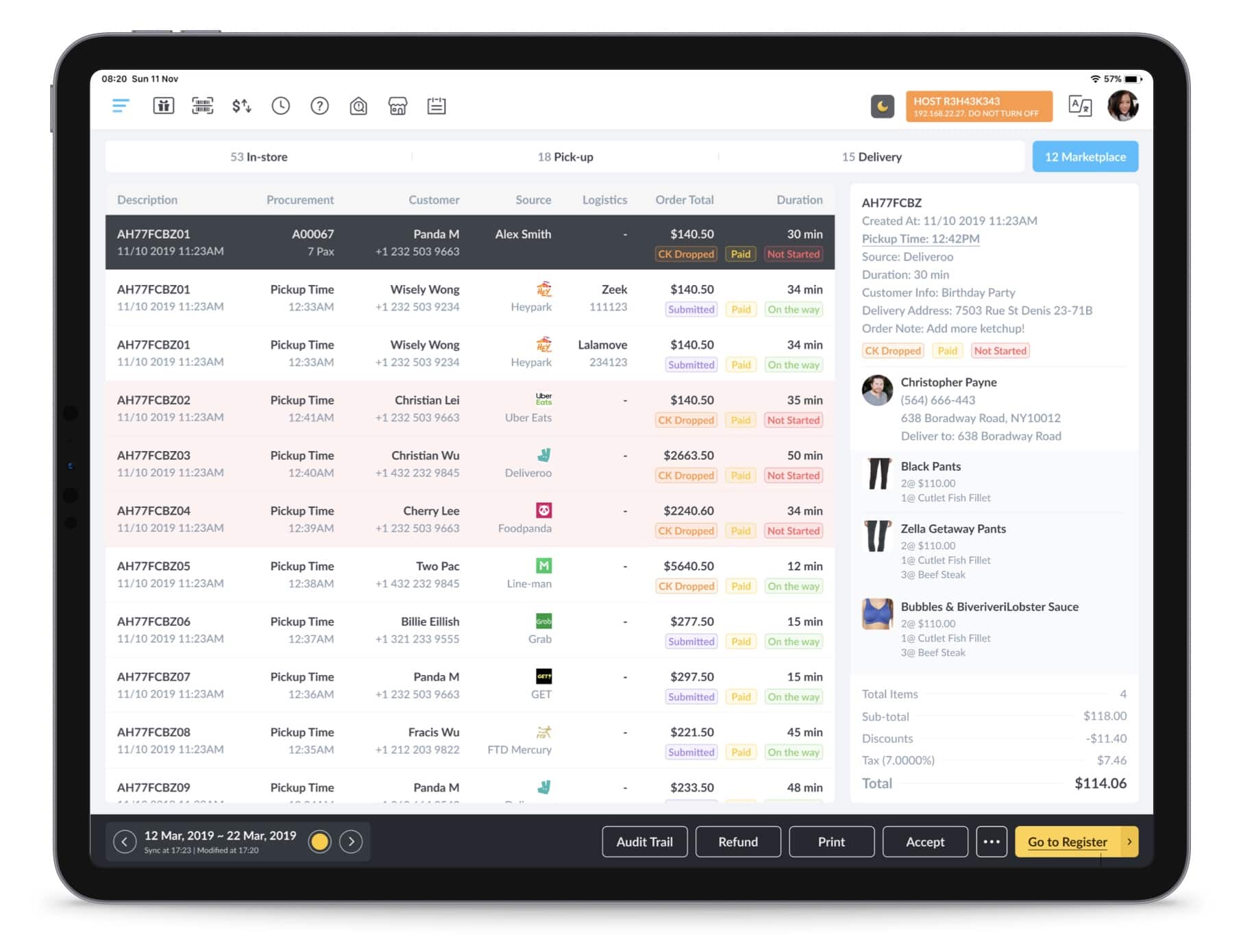
Prices: No Public
Pros | Cons |
|
|
Features:
- Easily manage your inventory with automatic and portable solutions
- Gain insightful and comprehensible business data at your fingertips
- Utilize gift cards as a cash alternative.
- Share detailed information across all stores, with individual setup options
- Accept all major offline and online payment methods
- Scan, order, and pay conveniently from any mobile device
6. Supermax POS — Streamlined POS system for online and in-person retail
Supermax POS for Magento is a versatile solution that comes with a kitchen and bar display system, real-time synchronization, and numerous other features.
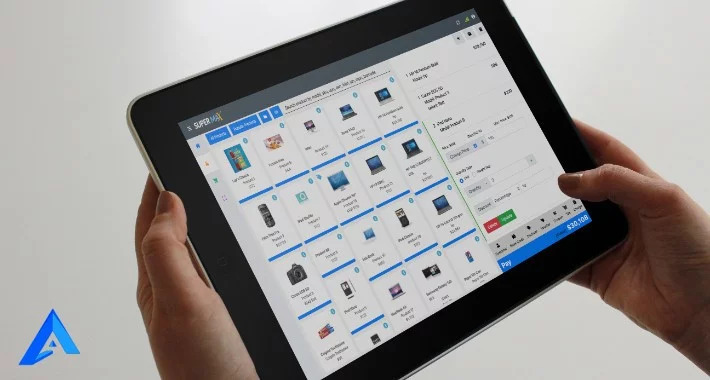
Prices:
Product:
- Magento Open Source: $599
- Magento Enterprise Edition: $1,198
Support:
- 3 months: no extra cost
- 15 months: $499
- 27 months: $799
- 39 months: $999
Installation service: $49
Pros | Cons |
|
|
Features:
- Works in different languages and currencies, including those written from right to left
- Work offline and sync data automatically when online
- Utilize Google Angular Framework for seamless, pageless operation
- Enable quick checkout with payment method selection
- Add products via barcode scanning
- Allow POS users to apply custom discounts, taxes, and charges
- Support cart holding, custom payments, order status, and comments
- Facilitate product returns, price adjustments, and addition of custom products
7. Boostmyshop POS — Scalable POS system for Magento 2 with supplier management
BoostMyShop POS is an affordable Magento 2 POS extension created for retailers emphasizing dropshipping.
👉 Read more: BoostMyShop POS vs. Magestore POS
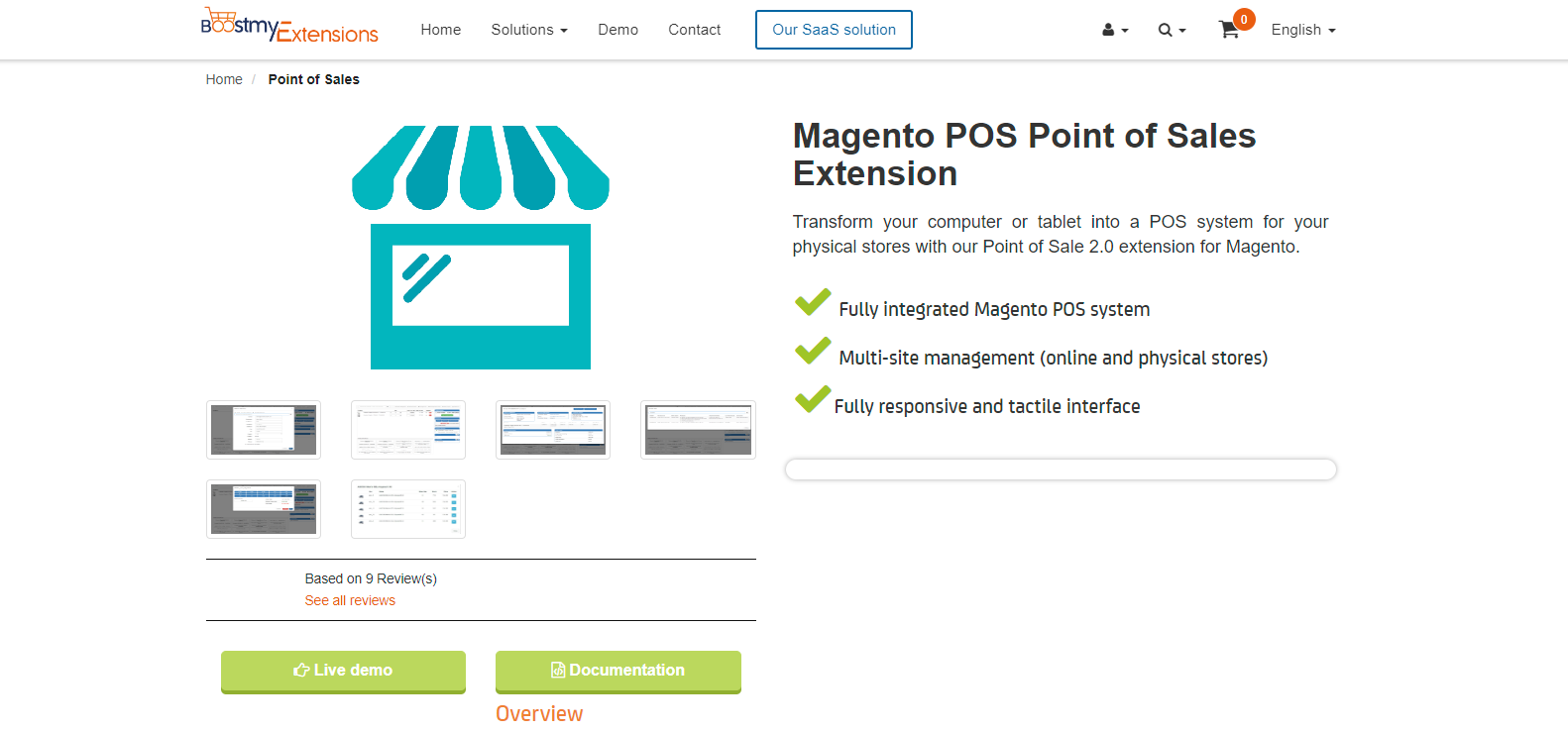
Prices: These payments are one-time
Product:
- Community: $487.65
- Enterprise: $902.51
Support:
- 3 months: Included
- 6 months: + $75.53
Installation: + $97.42
Pros | Cons |
|
|
Features:
- Store pickup as a shipping option for simple products
- User-friendly interface that supports touch screens
- Multi-user access across different websites
- Support for various payment methods, coupon codes, and customized pricing
- Quick shortcuts to add best-selling items to the cart
- Automatic receipt generation and printing
- Z-report generation
8. Acid POS — Cloud-based POS system with strong customer engagement features
Acid POS is a feature-packed non-native point-of-sale system designed specifically for florists, fashion retailers, and wholesale businesses.
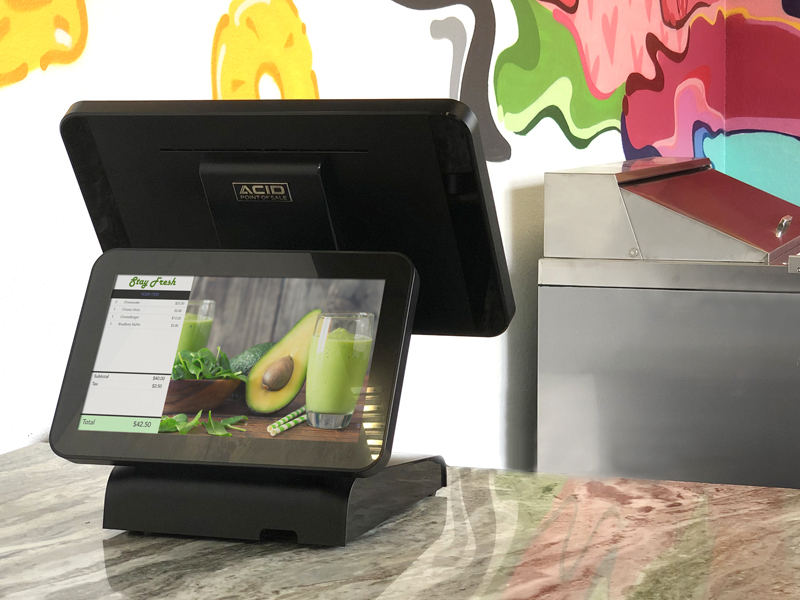
Prices:
- Single retail store: $465/month
- Florist POS: $595/month
- Enterprise POS: custom
Pros | Cons |
|
|
Features:
- Manage tickets, tips, and donations
- Automatically synchronize data across inventories, physical stores, and online stores
- Offer reports on payments, taxes, wholesale transactions, and sales by brands
- Access customer information and purchase histories, with the option to add custom fields for additional insights
- Implement loyalty rewards and tier-based discounts
- Monitor staff performance and attendance
- Manage labels and barcodes
- Administer permissions and roles for various users
- Handle refunds and exchanges
- Customize product attributes like size and color during checkout
- Enable flexible transactions, including split payments, in-store pickups, discounts, layaway, and invoicing
9. Lightspeed POS — Intuitive POS and payments platform for retail
Lightspeed POS is notable for its comprehensive range of software tailored for different industries, such as golf, restaurants, eCommerce, and retail, creating an extensive ecosystem of solutions.
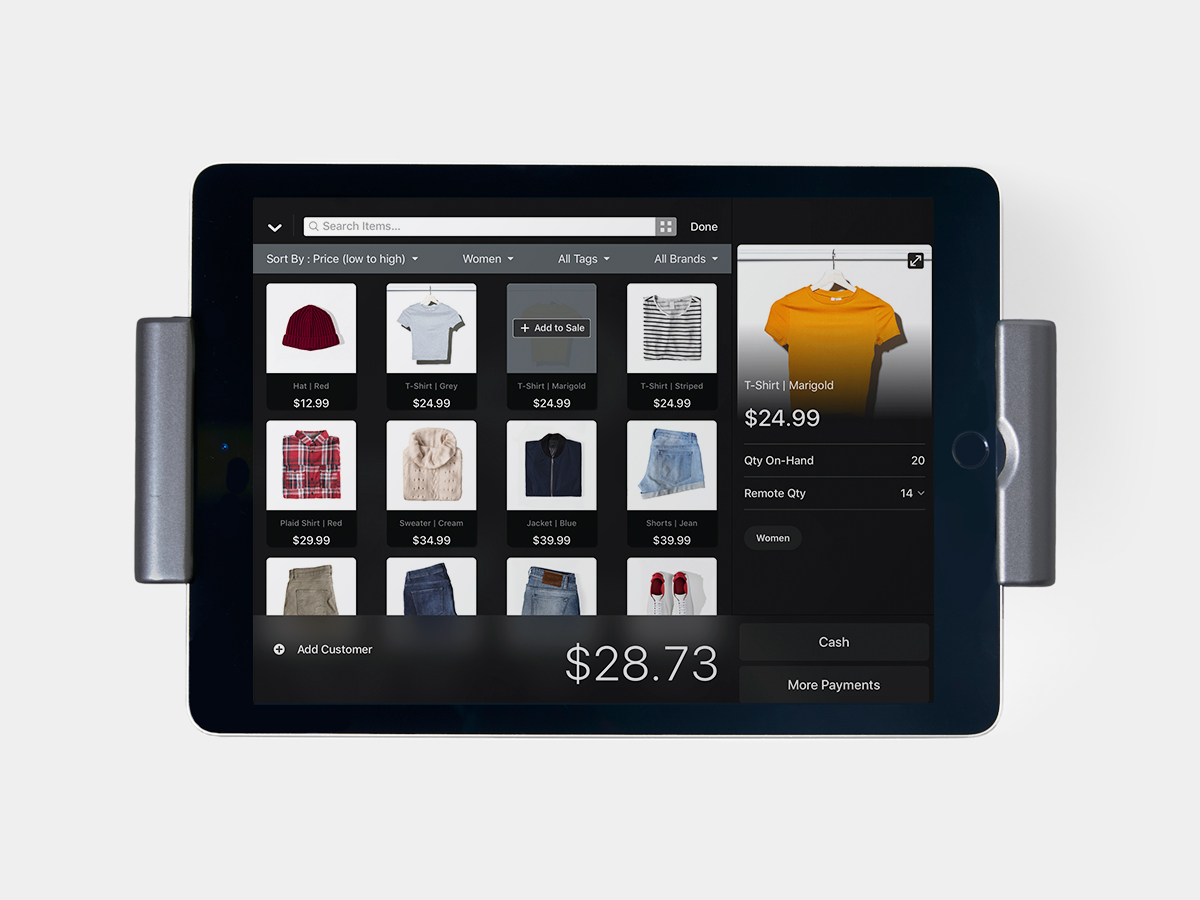
Unlike other checkout systems linked to specific e-commerce platforms, Lightspeed POS stands alone.
It can easily connect with different eCommerce systems, making it compatible with a variety of businesses. But because it’s not native to any platform, some unexpected issues might occur during integration.
👉 Read more: Magestore vs LightSpeed
Prices:
Lean:
- Product: $69/month
- Transactional fees: Card-present rate: 2.6% + 10¢, card-not-present rate: 2.6% + 30¢
Standard:
- Product: $119/month
- Transactional fees: Card-present rate: 2.6% + 10¢, card-not-present rate: 2.6% + 30¢
Advanced:
- Product: $199/month
- Transactional fees: Card-present rate: 2.6% + 10¢, card-not-present rate: 2.6% + 30¢
Enterprise:
- Product: Custom quote
- Transactional fees: Preferred payment rates
Pros | Cons |
|
|
Features:
- Empower businesses to sell products both in physical stores and online
- Provide tools for managing inventory, including custom categories, quick edits, and transfers
- Offer reporting and analytics tools to gather insights
- Enable businesses to create exceptional customer experiences through barcode scanning, special orders, automatic discounts, and more
10. Clover POS — All-in-one POS with customizable software and hardware
Clover POS is well-known for its user-friendly nature and hassle-free setup.
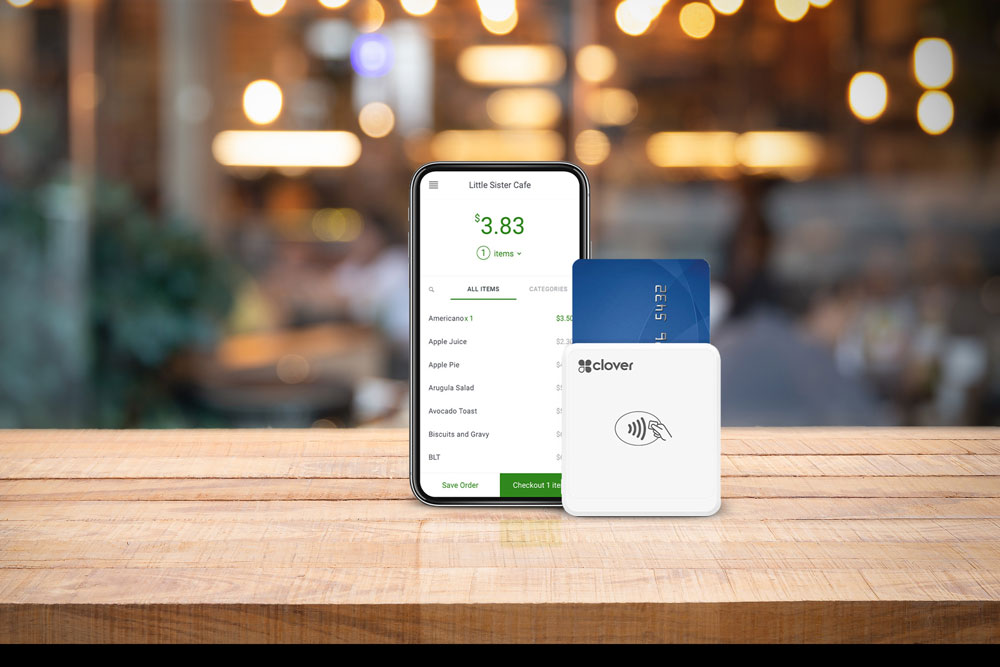
The hardware and software components are nearly prepared for immediate use.
Furthermore, there’s an option to opt for a preloaded menu. The system is intuitive, only taking 15 to 20 minutes to master.
👉 Read more: Clover POS system vs Magestore
Full-service dining | Full-service dining | Full-service dining | Quick service dining | Quick service dining | Quick service dining |
Starter | Standard | Advanced | Starter | Standard | Advanced |
$1,699+ $84.95/mo or $160/mo for 36 months | $2,298+ $99.90/mo or $210/mo for 36 months | $4,097+ $114.85/mo or $310/mo for 36 months | $799+ $54.95/mo or $100/mo for 36 months | $1,799+ $54.95/mo or $140/mo for 36 months | $2,398+ $69.90/mo or $190/mo for 36 months |
$14.95/mo for each additional device | $14.95/mo for each additional device | $14.95/mo for each additional device | $14.95/mo for each additional device | $14.95/mo for each additional device | $14.95/mo for each additional device |
Prices:
Pros | Cons |
|
|
Features:
- See all your sales, stock, and customer info on one dashboard
- Make your own items, services, changes, categories, and discounts on a handy item grid
- Save customer details, follow their buying history, and use CRM tools, loyalty programs, and feedback options
- Take different payments easily with a fixed rate and no secret charges
- Set up an online store, sell on social media, and connect with 3rd-party apps
Best free POS system for Magento
1. PayPal Zettle — Simple payment checkout solution for small businesses
PayPal Zettle is ideal for small businesses selling in person. Your PayPal account and Zettle app are free, with only payment processing fees of 2.29% + $0.09 for in-person cards and contactless sales.
The app is versatile, working on Apple and Android devices. It allows quick data input, discounts, inventory tracking, sales reports, and more on the go.
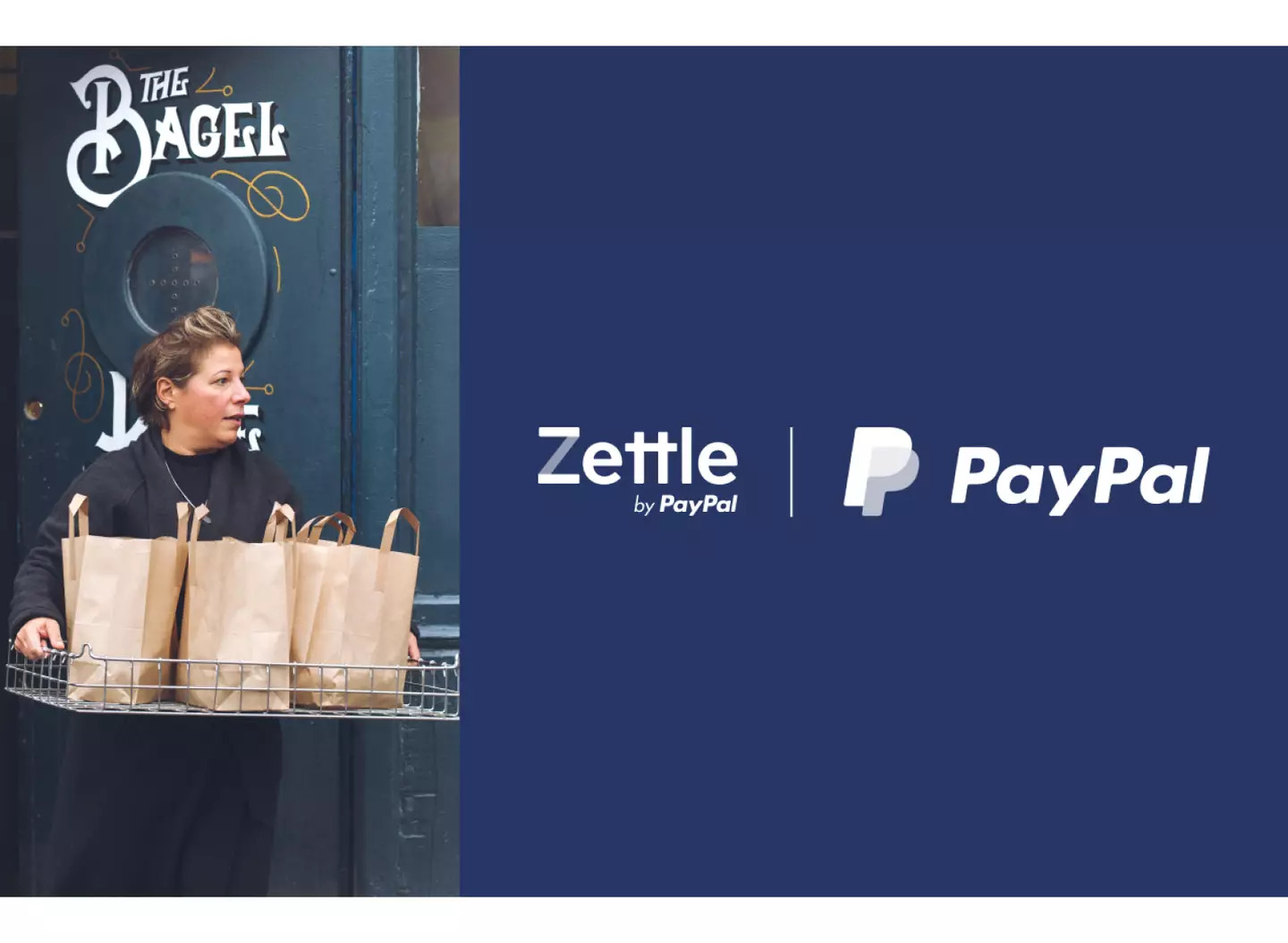
Prices:
PayPal Zettle app: free
Transaction fees:
- 2.29% + $0.09 per transaction for card-present transactions
- 3.49% + $0.09 per transaction for manual card entry transactions
- 2.29% + $0.09 per transaction for QR code transactions
- 3.49% + $0.49 per transaction for invoicing (PayPal payments)
- 2.99% + $0.49 per transaction for invoicing (cards and alternative payment methods)
POS hardware:
- $29 for the first card reader and $79 for each additional card reader
- $199 for a POS terminal, and $239 for a POS terminal with a barcode reader built-in
Pros | Cons |
|
|
2. IWD Magento 2 POS — Easy POS extension for Magento 2 with barcode and receipt support
As a POS extension for Magento 2, IWD Magento 2 POS stands out for its stability within the platform. The extension is exclusively designed to function with PayPal, allowing you to experience all the benefits that PayPal has to offer.

Prices:
- POS: free
- PayPal card reader: $29 for the first card reader, $79 for each additional card reader
- PayPal transaction fees
Pros | Cons |
|
|
Features:
- Support PayPal-standard security measures
- Browse and filter products and orders
- Incorporate coupons and apply discounts
- Locate customer accounts or create new ones during checkout
- Facilitate refunds
- Synchronize products, inventory, shipping, and payment methods from your Magento stores
3. Square POS — Easy-to-use POS system for start-ups or small businesses
Square POS’ free version is user-friendly and straightforward to set up, offering basic functions on the Magento platform. Furthermore, its payment processing is both swift and efficient.
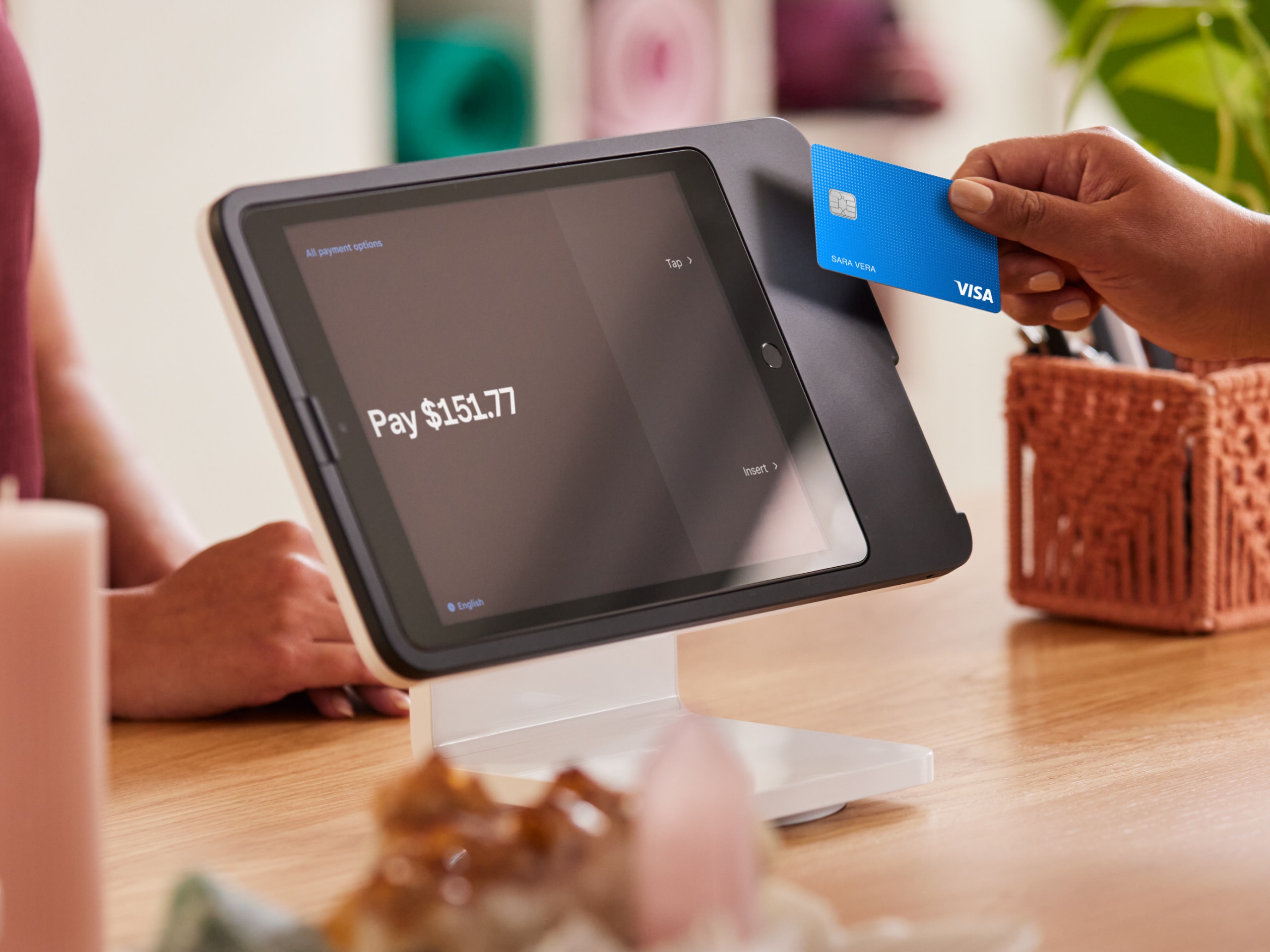
Prices:
- POS system: Free
- Processing: 2.6% + 10¢ for contactless payments and card swipes
- Hardware: May cost up to $799
Pros | Cons |
|
|
How to choose the best POS system for Magento
Choosing the right Magento POS system can be complex due to three factors: the constantly evolving point of sale landscape, the intricate nature of the Magento platform, and the limited expertise and experience of retailers in assessing their options.
To streamline the process of selecting the right vendor, we’ve put together essential criteria and a comprehensive guide for choosing a Magento-compatible POS, available right here:
Must-have criteria for the best POS system for Magento
1. Integration with the Magento platform
Integration presents two-fold demands.
Firstly, find a POS that can integrate seamlessly with Magento. For this, it’s crucial to consider the concepts of native and non-native POS within the Magento environment to avoid data discrepancies.
A Magento-native POS is designed to work smoothly within Magento’s environment. This enables retailers to oversee both online and in-store sales through a single unified system. Some examples of Magento-native POS options in the market include Magestore POS and Webkul.

On the other hand, a Magento-non-native POS doesn’t come with built-in integration to Magento. Unlike the native version, a non-native POS might require additional customization or 3rd-party integration to function alongside Magento. Examples of Magento-non-native POS options include CloverPOS and Lightspeed POS.
There are considerably more Magento-non-native POS solutions available compared to native options. Opting for one of these alternatives for your business comes with notable drawbacks:
- Expensive API connections between Magento and the POS
- Extra costs to reconstruct these connections when Magento updates its features
- Unstable performance on Magento
- Data discrepancies in inventory and loyalty program between the online and offline channel
- Missing out on many Magento features due to the weak link between the platform and the POS
Secondly, select a platform that smoothly integrates into your existing setup. This applies to additional tools like accounting software or labor management systems, enhancing functionality through collaboration. For example, integrating POS with accounting automates daily sales synchronization.
Another crucial consideration is the capability of the POS software to seamlessly integrate with POS hardware devices, as discussed in the preceding hardware section. Typically, POS choices that are customizable and scalable tend to offer the simplest connections to a range of hardware alternatives.
>>> 7 Best POS Systems for QuickBooks Integration in 2023
>>> 7 POS Integration with NetSuite to Sync Data in Real-time 2023
2. Effective checkout
The speed at which customers can check out directly impacts your daily sales figures. It’s a simple equation: a faster checkout process leads to more sales.
To assess this aspect, consider the POS system’s speed and its ability to handle orders efficiently. This is particularly crucial during peak times when transaction volumes are high. While evaluating, also explore the option of integrating with the best Magento POS barcode system. This integration would remove the necessity of manual item retrieval and addition, ultimately leading to a substantial acceleration of the checkout process.
This checkout speed challenge becomes even more evident for retailers with multiple stores and a substantial daily order volume. A case in point is one of our customers, Greg Penno.
He operates a pet product business across 9 locations in Canada, managing a vast inventory of 8,000 product SKUs. With around 100 employees, Greg’s business processes between 1,200 to 1,800 orders each day.
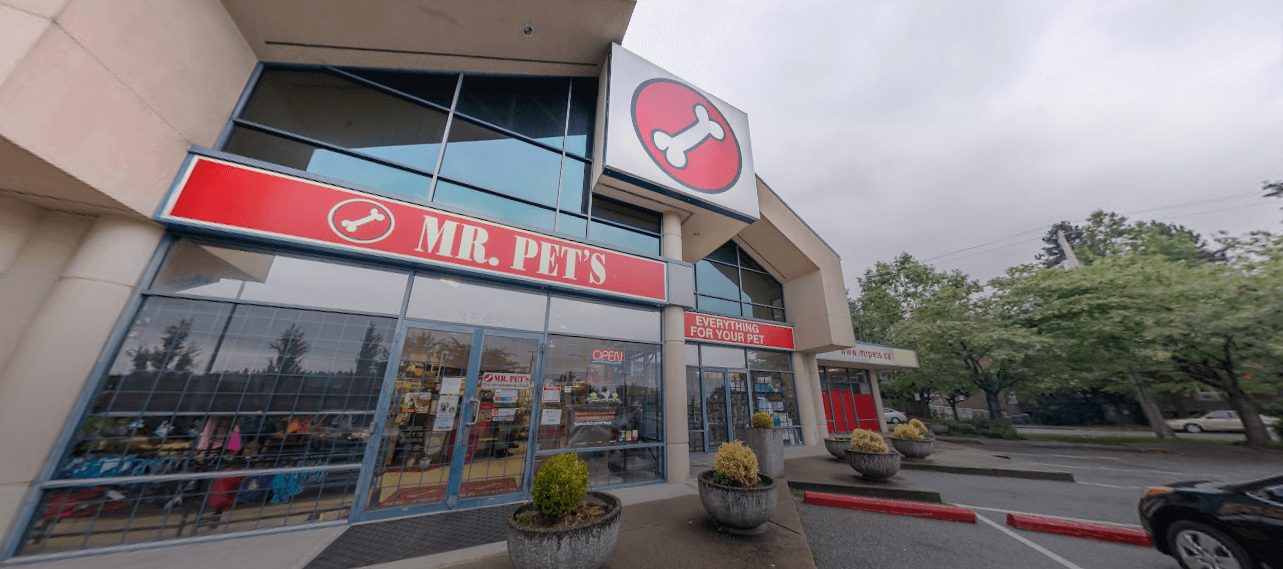
Before implementing Magestore POS, Greg’s business faced a checkout speed issue due to the simultaneous operation of 21 cash registers. Moreover, limitations with their scanners occasionally resulted in items not being properly registered, leading to inaccuracies in sales data.
Drawing on his 26 years of business experience in Canada, Greg and his team realized the necessity of a Magento-native POS that shared the same database as their Magento website. This understanding guided their decision to choose Magestore as their partner, and their experience thus far has been positive:
”“We are scanning at 110 items in 30 seconds, it might even be able to scan faster if we had a faster scanner.”
Greg PennoStore Owner - Mr. Pet's
However, checkout speed is just a part of the equation.
Retail is undergoing a transformative phase, reshaping the role of stores at a rapid pace.
In this evolving landscape, the checkout experience remains a pivotal element. It serves as the culmination of the shopping journey, finalizing transactions, and ensuring smooth consumer interactions. Modern technologies like computer vision, RFID, IoT sensors, in-store mobile apps, and kiosks are enabling innovative experiences. These advancements reduce friction, streamline checkout processes, and optimize operational management, enhancing the overall shopping experience.

However, not all checkout options suit every retailer’s needs. Consider a high-end clothing brand that could benefit from mobile checkout, while a supermarket might find self-checkout systems more advantageous.
Each company must identify the optimal strategy for improving queues and customer service, tailoring it to their specific situation.
It’s worth noting that these innovative checkout methods are not native features of Magento. Consequently, once you’ve identified the optimal checkout solution, the next crucial step involves selecting a POS system that can seamlessly integrate with and support your desired checkout process.
Magestore, for instance, offers self-checkout functionalities, providing versatile options for enhancing the checkout experience. Let’s see how to configure self-checkout and use it in Magestore POS.
3. Ease of use
When implementing a new POS system, its impact on store associates is immediate. POS systems differ in terms of user-friendliness, which directly affects how comfortable and confident staff members feel while using them.
Ensuring that store associates are at ease and confident in their interaction with the POS is crucial due to their consistent engagement with it. This consideration is especially important for businesses with intricate operations, such as restaurants or multi-location retailers.
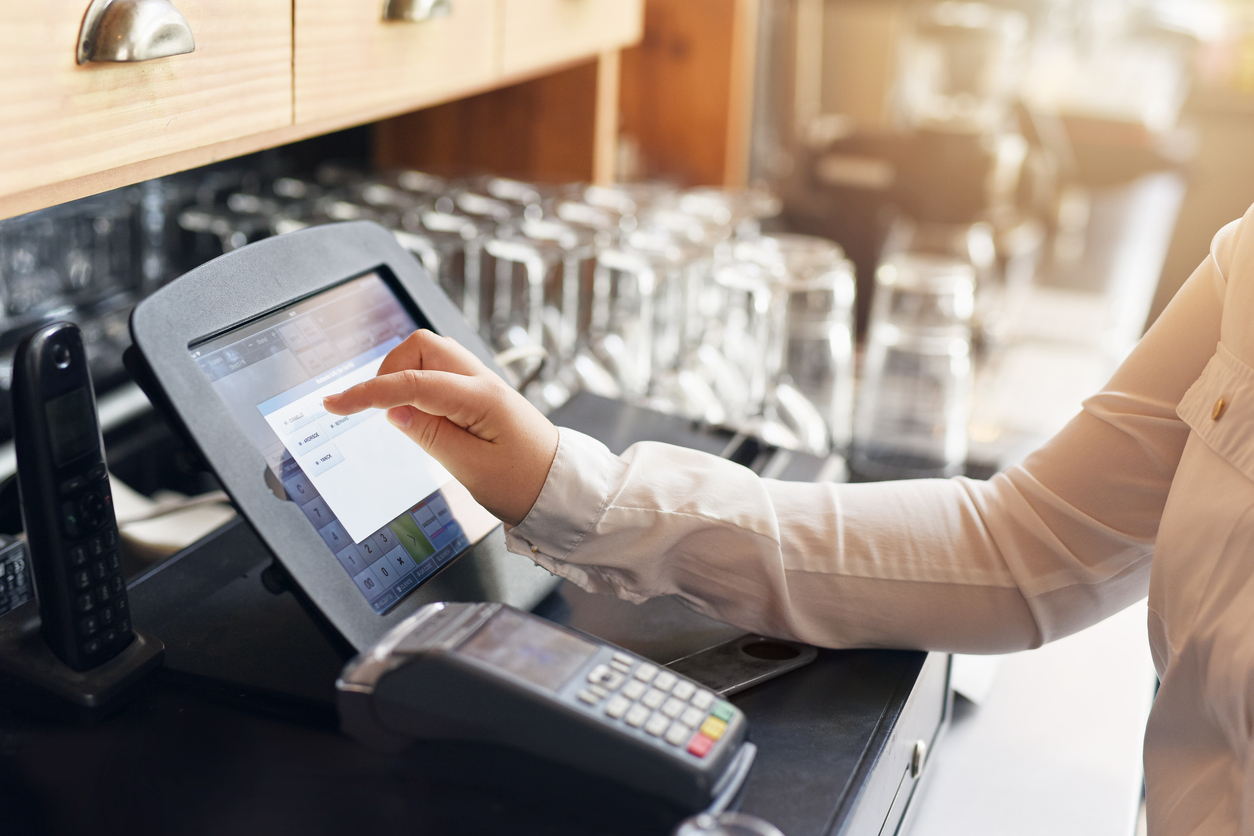
Aphid Consulting, an IT consulting agency in Vancouver and Victoria, has been a steadfast partner of Magestore since the inception of Magestore POS. One of the aspects that resonates strongly with them is the user-friendliness of our product:
”“Our site has launched now and the POS has been received very positively. Most of the staff have picked it up without any stress and minimal training. Since launch, we have had zero technical issues, zero configuration issues, and zero training issues. It has been a complete success.”
Shane DoerksenSolution Architecture Director - Aphid Consulting
To evaluate user-friendliness, consider conducting demonstrations with employees using a POS demo. This will help assess usability and learning curves effectively.
Ensure your POS meets this critical requirement by using the Ease of Use Checklist:
- Quick employee training
- Minimal learning curve
- Intuitive interface
- Preconfigured hardware
POS vendors vary in their demo policies. At Magestore, we provide personalized demos and free solution design for every business, especially beneficial for those using the Magento eCommerce platform.
4. Scaling
As your business expands, ensure your POS system can grow with you. Look for scalability, streamlined multi-location management, and the ability to accommodate growth.
Be cautious of additional costs common with SaaS POS though, where lower monthly fees can escalate as you add stores, users, and devices.
This extra cost issue became evident for one of our customers, Kristina Žugov, who owns FunBox, a gift shop in Estonia. Kristina shared her experience when she aimed to expand her stock and stores.

In Estonia, retailers are required to pay a software rental fee based on their product volume. Consequently, it’s crucial for merchants to calculate these expenses from the outset to prevent budgetary strains.
”“If you have like 5,000 different SKUs then it will cost you extra. You’ll probably have to pay €100 monthly to rent the local software for creating sales in the store and connecting to the web store. This is only the rental costs.”
Kristina ŽugovStore owner - FunBox
Considering their expansion plans, FunBox realized the importance of prioritizing a cost-effective and future-proof solution over just the low upfront cost.
They chose Magestore as their eCommerce partner and just had to pay once for the license fee based on the number of stores at the time of purchase.
The decision turned out well, as the investment was recovered within 1.5 years and showed better financial efficiency than renting software.
”“So with the price we paid for this solution, it’s been one and a half years, and you’re at zero. All that goes further on is saved from this point. Plus, you have more functions.
Kristina ŽugovStore owner - FunBox
Then, cost-wise, let’s say to rent accounting software, it’s much more expensive than purchasing Magestore solution and implementing it. As it doesn’t require connecting with any specific or additional stock system.”
5. Customization
Every business has distinct needs beyond the default features provided by POS vendors. For example, a restaurant owner might require a POS that can handle split bills and tableside ordering, while a retail store could prioritize finding the best POS inventory for Magento.
Furthermore, businesses aiming to stand out or implement unique ideas often need customization, as exemplified by one of our clients—a vape business. This client sought to enhance customer service by adding notes to each customer in the POS, aiming to improve overall satisfaction.

Additionally, they sought synchronization between the backend and POS notes for a comprehensive overview of previous interactions. Magestore custom POS helped turn this goal into reality:
”“We had looked at some other POS providers, but we just feel that Magestore is the best solution for our business. Being able to customize is huge for us. That’s really what we need and the Magestore team is great to work with for our needs”
MatthieuStore Owner - Upper Limits
POS customization is essential to align it with your unique business requirements, incorporating the necessary features and integrations.
Here’s what you should consider when evaluating a POS partner’s customization capabilities:
- Direct interaction with vendors for personalized POS customization
- Seamless integration with 3rd-party apps and high-quality hardware
- Various ‘Settings’ choices for tailoring specific behaviors
- Adaptable architecture
It’s essential to understand that not all POS vendors claiming to offer customization are genuinely committed to shaping their products based on customers’ ideas. Some may try to steer customers towards adapting to their existing offerings.
To identify such a provider, consider scheduling calls or chats with representatives from various POS vendors. Observe how they respond to your requests for customization and select the one that exhibits a willingness to tailor a product specifically for your business.
This approach mirrors the strategy employed by Matheus Santos, the owner of Top Shoes.
Top Shoes operates through a network of franchises, providing owners with products, a retail system, and comprehensive support. This approach empowers franchise owners to focus on customer acquisition and sales, while Top Shoes oversees operational aspects.
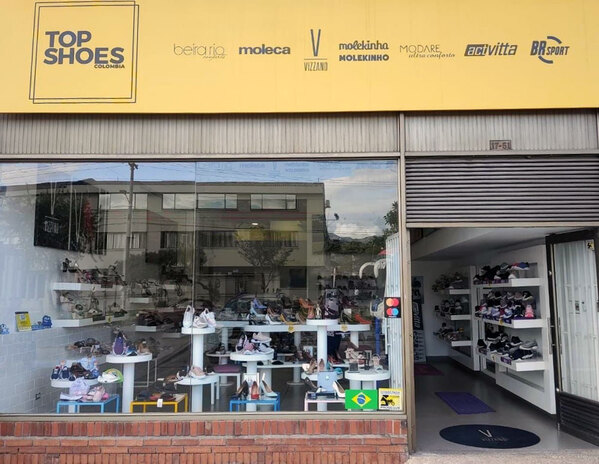
To bring this innovative model to life, Top Shoes needed a solution that could efficiently manage footwear products across the system. Scalability was also crucial to accommodate the growing number of franchises.
After consulting with various POS vendors, Matheus ultimately chose Magestore because we offered precisely what he needed—a unique POS system built on Magento that aligned with his franchise model.
”“All other consultants that we talked to heard us and tried to sell something that they had and make us fit their products. And with Magestore it’s the other way, Magestore is fitting to our idea.”
Matheus SantosOwner - Top Shoes
6. Data security
The potential expenses resulting from a POS security breach are significant.
These include investigation costs, legal fees, possible fines, reputation damage, and a likely loss of customer loyalty. Your business could face a multi-million dollar setback.
To prevent such outcomes, prioritize the security of your business and customer data by adhering to payment card industry (PCI) compliance and implementing point-to-point (P2P) encryption.

To guarantee your POS aligns with this pivotal factor, go through the Data Security Checklist:
- PCI/P2PE compliance
- Malware protection
- Network security
- Adherence to Europay, Mastercard, and Visa (EMV) standards
Another prominent data security concern raised by many of our retail customers revolves around the exposure of their own data when subscribing to a SaaS POS.
The unease stems from effectively “leasing” the solution from the POS vendor monthly, limiting control over data management, which rests with the POS providers.
This concern had an impact on FunBox’s POS selection process, as seen in Kristina Žugov’s experience. She highlighted this factor while making her POS choice and eventually discovered the solution with Magestore.
Magestore POS, a web-based solution, addresses this need by allowing customers to take 100% ownership of the POS system and data.
”“Nobody sees it (our data). It’s totally secure and discreet.”
Kristina ŽugovStore owner - FunBox
If this concern resonates with you, consider purchasing a POS solution instead of subscribing. This ensures maximum control and ownership over all aspects.
7. Value for money
Cost is a crucial factor in any purchasing decision.
It’s important to ask yourself: What will the expense be, and more importantly, what value will it bring? The adage “you get what you pay for” certainly holds true when it comes to point-of-sale systems. Sometimes, a higher initial investment leads to long-term benefits. Therefore, when you’re in the process of selecting the ideal POS system for your business, it’s essential to carefully assess both the total cost of ownership and the value it offers.
This principle finds clear illustration in the case of HoohaDesign, a studio based near Grimsby, United Kingdom, specializing in web design, branding, and illustration.

They were tasked with creating an omnichannel loyalty system for a jeweler client, a responsibility they took seriously. Faced with the challenge of meeting their client’s expectations, they made the decision to choose Magestore POS:
”“We have done development work with many other companies, and in terms of the cost paid for the functionality received, Magestore’s good value. We feel that the customization work and everything that we paid extra for is worth the investment.”
Marilena RuddCo-Founder and Web Development Director - HoohaDesign
Furthermore, it’s worth noting that more affordable POS choices, though they might lack certain features and comprehensive support, can still be suitable for businesses in their initial stages.
These startups might not possess the budget for a more advanced solution, making cost-effectiveness a priority. Striking the right balance between the system’s capabilities and the current stage of business growth is key.
As your business grows and requires enhanced capabilities from the POS system, you have two options to consider. One approach is to request your current POS provider to customize the initial solution, making use of your existing relationship. Alternatively, if the current solution can’t accommodate your evolving business model, you might opt for a more contemporary and customized POS system.
8. Customer support

Your chosen POS solution provider should not only ensure the setup and functionality of your system but also prioritize your confidence in using the technology.
Given that not all businesses possess expertise in system implementation and operation, it’s crucial to conduct a comprehensive assessment of your current position and future goals. This entails compiling a list of technical and non-technical aspects where you require assistance.
The commonly sought-after options include:
- Personalized consultation services
- Go-live service
- Customization service
- Premium support
- System operation
- Onboarding and training service
- Phone support
- Online support
- Knowledge base
- Video tutorials
Nice-to-have criteria for the best POS system for Magento
1. Reporting capabilities
One of the most valuable features of a POS system is its capacity to generate diverse reports, providing essential insights for retailers.
By analyzing daily, weekly, and monthly timeframes, you can uncover trends and identify sales patterns. This level of detail extends to viewing sales by suppliers and employees, aiding in recognizing top performers and optimizing staffing.

These capabilities provide a comprehensive understanding of your business performance, as the POS reports compile day-to-day retail activities into insightful data analytics.
Each business has its distinct characteristics, which necessitate a variety of specific insights. To identify the exact information your business needs, consult our comprehensive article:
>>> POS reporting — Definitive guide for savvy retailers in 2023
2. Uninterrupted service
Using a cloud-based POS system introduces the risk of disruptions due to Internet slowdowns or power failures. These emergencies can impact POS operations, potentially leading to sales loss.
To maintain continuous functionality during Internet outages, it’s essential to ensure that your POS supports sales transactions, offline data capture, and automatic data re-sync once the Internet is restored.

Only a handful of POS vendors can adeptly manage such scenarios. For instance, Magestore POS seamlessly transitions to offline mode when the connection is lost, guaranteeing uninterrupted operations. Upon reconnection, all your online and POS data will be synced seamlessly, ensuring your products and sales data from different locations like physical stores, online platforms, and warehouses are identical.
In contrast, certain options, such as BoostMyShop POS, lack measures to address the connection loss.
So to ensure uninterrupted service, the POS should meet the following crucial requirements:
- Securing sales transaction processing during Internet loss
- Automatic data re-sync upon Internet reconnection
- Managed parameters for offline credit card payments
A step-by-step guide on how to choose the best POS for Magento 2 website
1. Define all must-have features to run POS at selling points
Similar to seeking a partner, your quest for an appropriate POS system becomes notably smoother when you have a clear understanding of your requirements.
Hence, the initial stride in locating the ideal POS system for your Magento 2 website is to pinpoint all the indispensable features, functions, and associated services necessary for processing sales at physical stores, popups, or offline events. Subsequently, jot these down for reference as you evaluate various solutions.
Action steps:
- If you’re running a Magento 2 website, start by listing the essential features you currently require. Then, compare this list with the features of your shortlisted POS systems. Since a POS should have the capacity to expand with your business, also ensure to evaluate if any of the potential options are scalable and customizable.
- If your new business is striving to create a Magento website and needs a Magento POS system, start by jotting down the features and requirements for your eCommerce Magento site. Simultaneously, sketch out the crucial POS features you’re aiming for. While doing this, you should evaluate the expenses associated with operating a Magento website. This will help you gauge the investment you’ll need to make.
2. Determine your budget
What’s the right investment for a POS system in the Magento setup? The response hinges on the size and requirements of your business. There are a few aspects you should consider:
2.1. Hardware
A good POS system relies on both software and hardware. The hardware needs can vary. Some POS software only fits with specific types or brands of hardware, while others are more adaptable and can work with various hardware options.
If you need a system that works on mobile devices, like for your sales agents to take mobile orders, you can pick POS software that works on different web browsers or mobile devices.

Start by making a list of the POS system devices you require for your current operations. If you have plans for expansion, also note down the hardware necessary for your future growth. While doing this, don’t forget to factor in the prices of the POS system as well.
Action steps:
Spend a moment considering the hardware your store requires, and make a note of their brands and models. List them out and use this reference when verifying their compatibility with the POS system.
Here are a few examples of items you can include in your list:
Brand/Models | No./Units | |
Terminal (PC / Mac / Mobile) | ||
Receipts Printer | ||
Cash Register | ||
MSR/Payment Terminal | ||
Barcode Scanner |
2.2. Software
There are various types of POS systems in the market, including on-premise POS systems, cloud-based POS systems, mobile POS systems, self-service kiosks, and all-in-one POS systems. Each of these options comes with its own set of recurring and upfront costs, which can influence the overall cost of ownership.
If these terms are confusing, you can consult our comprehensive article that clarifies these POS system types and aids you in choosing the most suitable option for your requirements.

Additionally, our previously mentioned criteria for the best POS system for Magento will also be useful in this regard.
The payment model is another factor to think about.
You have the option to either subscribe to a cloud-based POS solution like Ebizmarts POS or make a one-time payment for a POS system. Usually, the one-time payment approach is offered with both on-premise and web-based POS options like Magestore POS.
The subscription model offers the benefit of lower monthly costs, while the one-time payment gives you complete control of all data directly in your Magento backend. This means no delays and no risk of data loss.
Action steps:
Make a note of these components in your store, and then refer to this list when you’re calculating your POS expenses.
3. Research and compare POS systems from different vendors
This is the step where you should dedicate time to thorough research on some vendors from the list. The quickest approach is to explore various channels and find out what fellow merchants similar to you are saying about the products and services offered by those companies.
Action steps:
Go into research mode and find potential POS solutions for your store. Be sure to tap into the following sources:
- Websites for software reviews such as Trustpilot, G2, Capterra, and Magento
- Marketplace
- Social media (LinkedIn Groups in particular)
- Online and print publications
Explore the vendors’ websites and give them a call to ask about their features and services. Make sure to gather details about the 10 criteria for the best POS system for Magento mentioned above, along with:
- Features and functionality of their solution
- Their prices
- Areas of expertise
- Business hours
- Warranty information
Recall the features you listed in Step 1? Compile all that information in a spreadsheet alongside the POS systems you’re contemplating. Then, assess your options based on this data.
4. Talk with sales and try a demo before you buy
“Seeing is believing”.
If you know all the information about the POS systems on paper, now let’s see them in action.
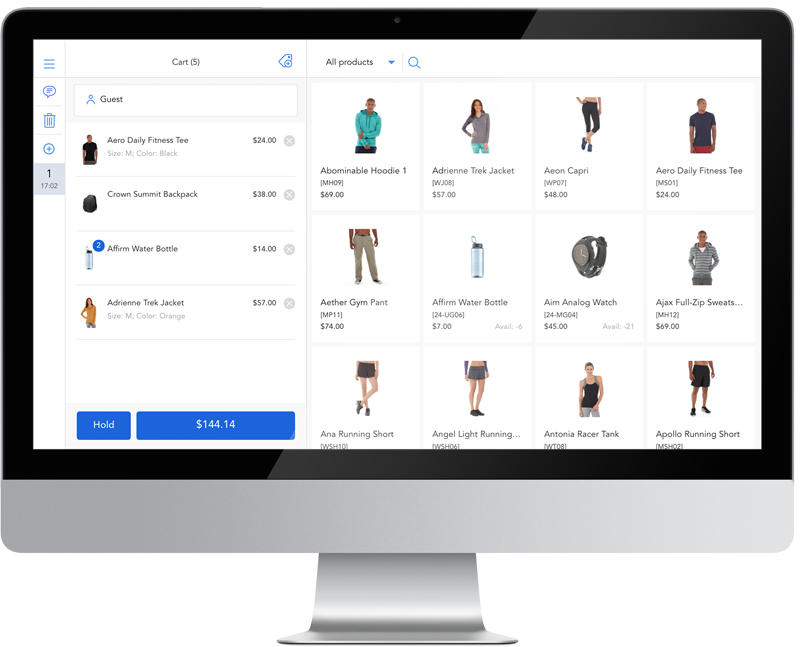
Action steps:
- List all the POS criteria that you find most necessary for your business (take from Step 1)
- Request sales (vendors) about the product’s references by talking to them directly
- Trial the solutions yourself. Observe the following:
Criteria | Magestore | Company A | Company B |
Speed | |||
Simplicity | |||
Rich features | |||
Real-time data syncing | |||
Checkout without the Internet | |||
Easy to scale up | |||
Easy to customize | |||
Easy to integrate via API | |||
Reporting |
Conclusion
Choosing the best POS system for Magento depends on individual business needs. New merchants with budget constraints might prioritize affordability, while established businesses value customization tailored to their retail operations. For those seeking customization and scalability, Magestore POS is the optimal choice. On the other hand, PayPal Zettle is an excellent free option for small businesses with limited transactions.
No matter your business stage, a thorough analysis of current requirements and future plans, along with evaluating potential POS partners, is crucial. This ensures you make a well-informed decision that aligns with your business goals.
FAQs
1. Does Magento have a POS system?
Magento—an open-source eCommerce platform, which is now Adobe Commerce, doesn’t include a built-in POS system. Nonetheless, numerous 3rd-party vendors offer POS solutions compatible with the Magento platform. However, the extent of these solutions’ integration with Magento and their feature sets can vary.
2. What is the best operating system for Magento?
If your business operations are complicated, you can use the Magestore retail management system for Magento. This helps manage all retail operations from checkout, payment processing, order and loyalty management to inventory, warehouse, and purchasing management. Besides, you can integrate Magestore POS with other tools such as CRM, ERP, accounting, and human resource planning to ensure you can sync all with Magestore easily without errors.
3. How do I find the best POS system for my business?
If you’re a Magento user, refer to the comprehensive guide above for assistance. To find the best POS system for your business, you need to understand your business type, and specific requirements, and consider factors such as included features, guarantee policy, support, and budget.
4. Is Magestore POS native to Magento?
Yes. Magestore POS system is the best Magento POS system because it’s designed for Magento merchants without requiring any 3-rd party extensions or connectors. This ensures your data from the Magento store and physical stores are synced completely.

